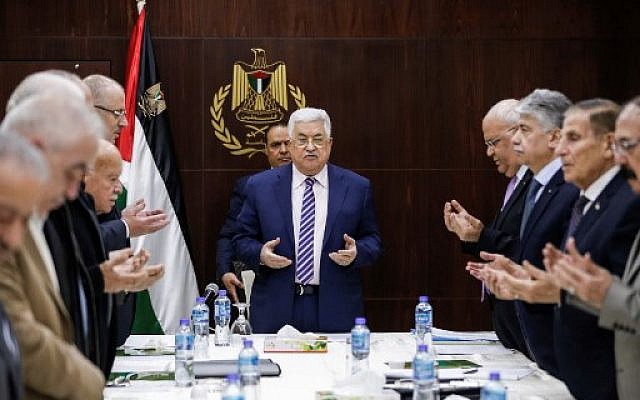Move by top-tier Executive Committee follows an earlier recommendation to cut ties in the wake of Trump’s recognition of Jerusalem as the capital of Israel

The Palestine Liberation Organization’s top leadership opened the way to suspending its recognition of Israel on Saturday, but stopped short of ordering the drastic measure immediately.
Withdrawing the PLO’s 1988 recognition would threaten decades of Israeli relations with the moderate Palestinian leadership and raise doubts over security coordination between the two.
It would also be seen as a fatal blow to the two-state solution.
The PLO’s Executive Committee released a statement after a three-hour meeting Saturday saying it would set up a committee to study the derecognition move.
The body also called for the Palestinian Authority to cut off all ties with Israel, including security coordination in the West Bank.
The executive committee urged Palestinian Authority President Mahmoud Abbas to “immediately start preparing plans and projects for disengagement steps with the Israeli occupation government at the political, administrative, economic, and security levels.”
The disengagement plans will be presented to the PLO Executive Committee for approval, the statement said, without setting a deadline.
The organization’s top body was meeting for the first time since thePalestinian Central Council, another arm of the PLO, called for the step last month.
The Palestinian leadership has become increasingly frustrated with the American administration, particularly since President Donald Trump’s controversial recognition of Jerusalem as capital of Israel, in a break with decades of international consensus that the city’s fate should be decided in peace talks.
After the Trump declaration, Abbas declared that the US could no longer serve as a peacebroker, and instituted a boycott of the Trump administration, cancelling a planned meeting with US Vice President Mike Pence and refusing to meet with US peace envoy Jason Greenblatt.
Trump’s move was hailed by Prime Minister Benjamin Netanyahu and by leaders across much of the Israeli political spectrum, while enraging Palestinians and prompting condemnations worldwide.
The Palestinians, who also see East Jerusalem as their capital, cut off ties with the Trump administration and said his decision had placed in jeopardy their relations with Israel.
The PLO committee on Saturday denounced the US administration’s “campaign of incitement and distortion against President Abbas and the Palestinian leadership.”
This campaign, it said, was aimed at justifying Washington’s “arbitrary and punitive measures against the Palestinian people and providing a cover for passing its plan to liquidate the Palestinian cause.”
The US administration, the PLO committee added, “must stop dealing with the Palestinians with the language of blackmail and threats. We call on the US administration to stop its hate speech and to stop denying the presence of the Arab Palestinian people in this country throughout history.”
The PLO renewed its call on US President Donald Trump to backtrack on his decision to recognize Jerusalem as Israel’s capital.
“In light of these decisions, the US administration has disqualified itself from playing the role of honest broker in any peace process,” the PLO said. It called for holding an international conference “on the basis of international resolutions” to solve the Israeli-Palestinian conflict.
Last month, the PLO’s Central Council, a lower decision-making body, called on the Executive Committee to suspend recognition of Israel until it recognizes the state of Palestine and halts the building of settlements.
Western countries have been lobbying senior Palestinian officials to convince them not to take such a step, multiple diplomats said.
At Saturday’s meeting, the PLO also called for “freeing the Palestinians from the restrictions of the Protocol on Economic Relations, also known as the Paris Protocol, which was signed between Israel and the PLO in 1994.
The PLO committee accused Israel of failing to fulfill its obligations in accordance with the agreements signed with the Palestinians.
It renewed its call for a ban on goods produced in settlements and “expanding the boycott of Israeli products.”
The committee also called for boosting economic and commercial relations between the Palestinians and Arab, Islamic, EU and “friendly” countries.
As reported by The Times of Israel
